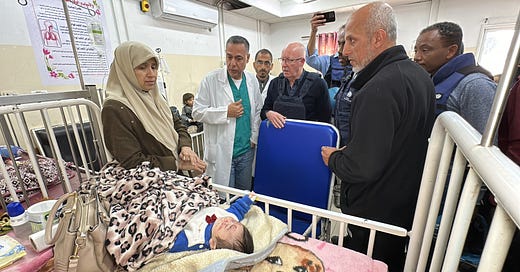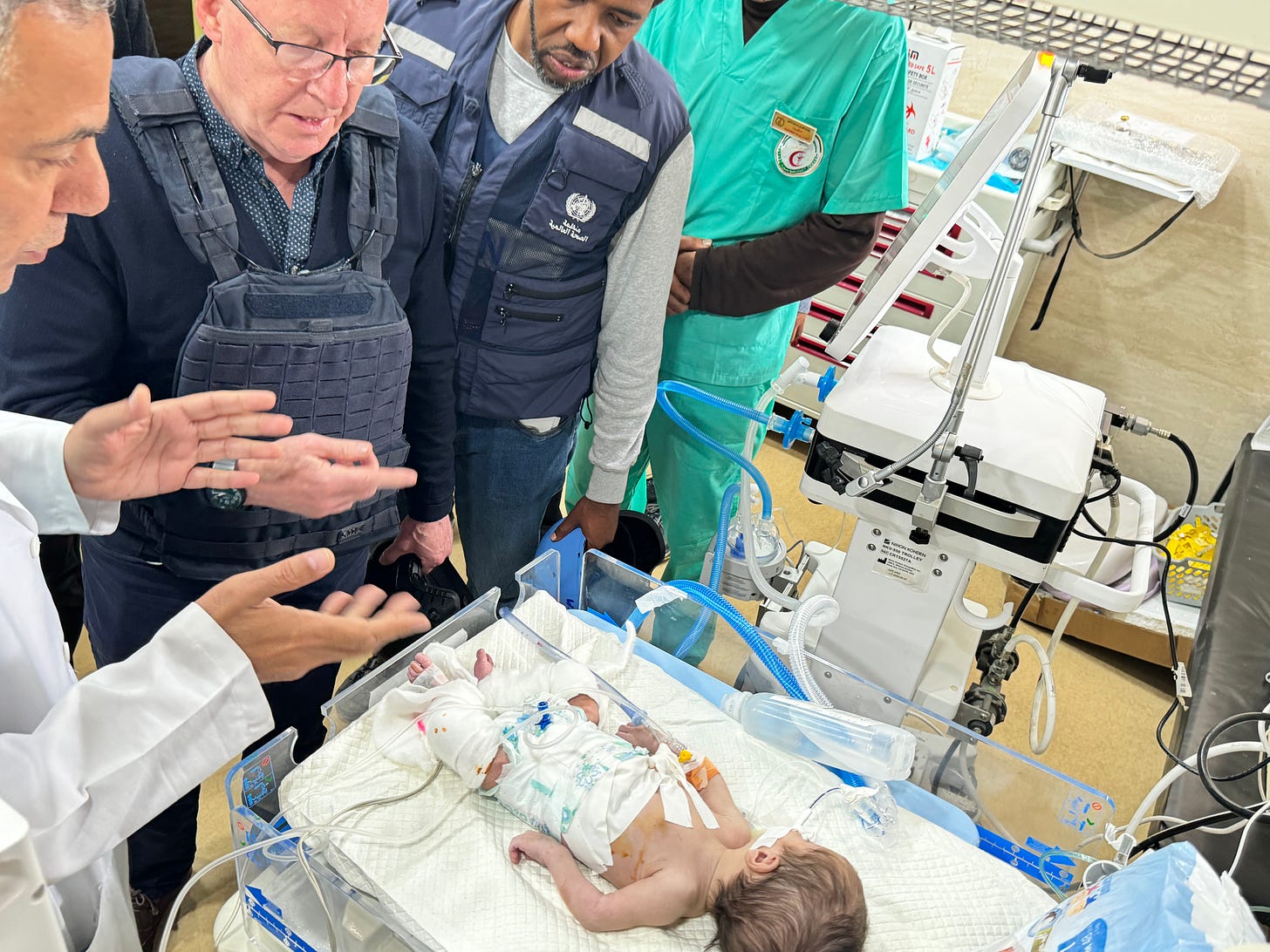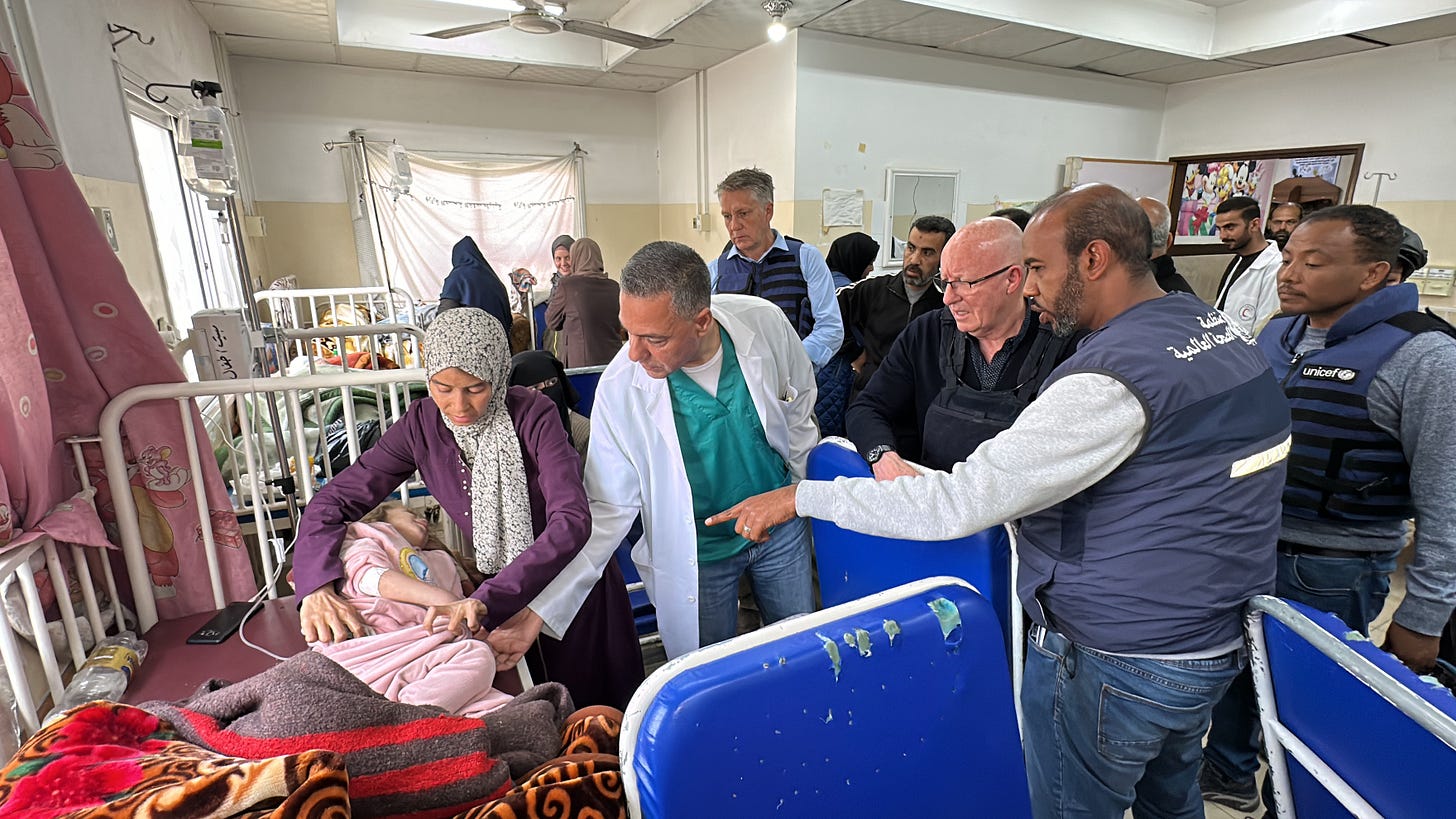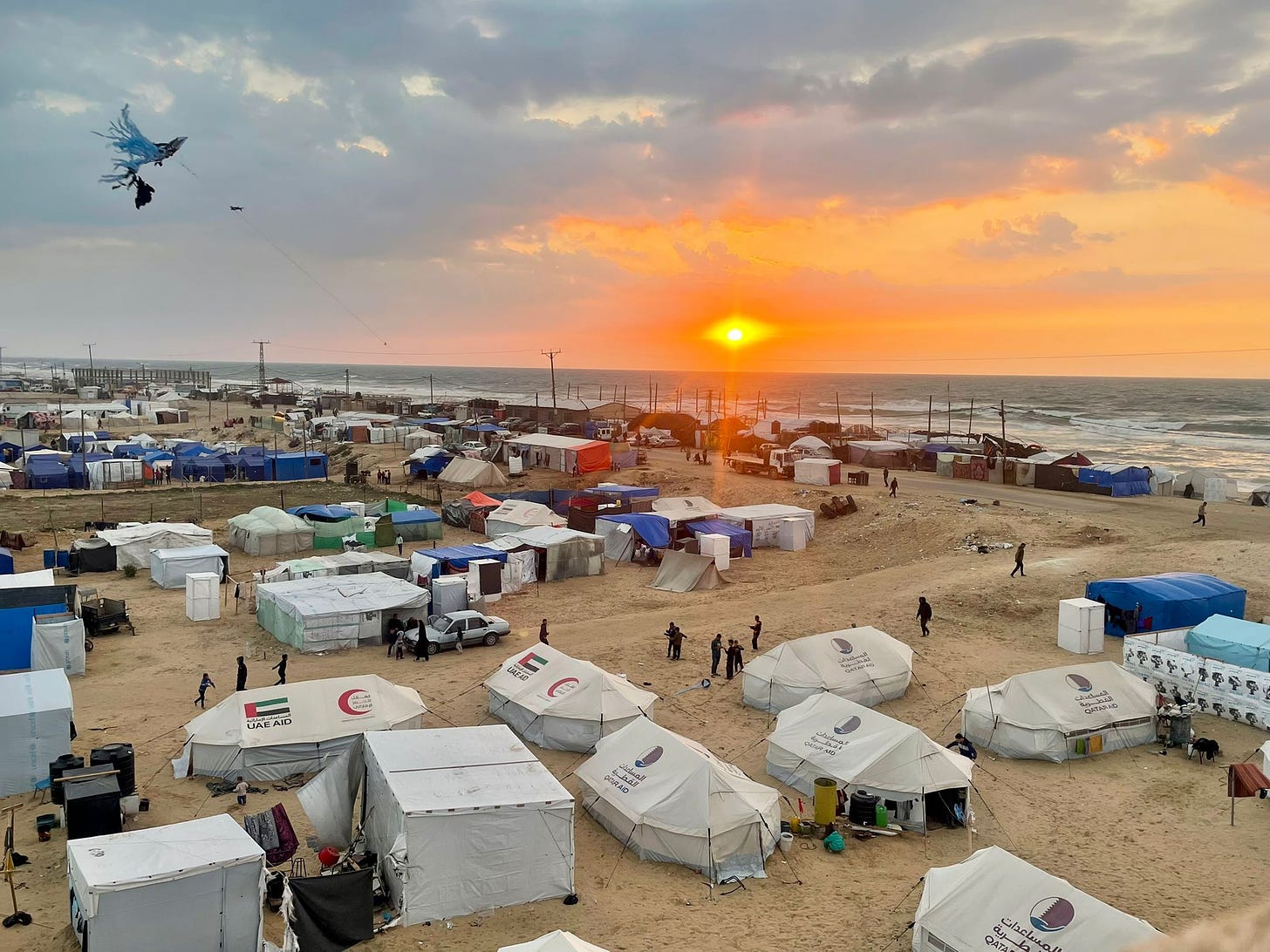What the UN humanitarian coordinator for Palestine saw on his last visit to Gaza
I spoke with Jamie McGoldrick, the Scottish-Irish man serving as the UN's humanitarian coordinator for the occupied Palestinian territories about what he saw in Gaza last week.
Philippe Lazzarini, the head of UNRWA had his permission to enter Gaza denied by the Israeli authorities this month. Did you have any concerns that that would happen to you?
No. I think in the eyes of Israelis UNRWA is an organisation they don't want to do business with and I think this is another sign which is unfortunate because Lazzarini is an Undersecretary General - it's not something diplomatically that should happen. I know they've given reasons for the refusal including paperwork and stuff like that. But I know inside Gaza the UNRWA staff were very unhappy that they hadn’t a good chance to get to see him come back in again and see for themselves what changes have happened since he was last there.
For this trip, what were you priorities?
Because of the IPC report that came out earlier this month, I was very keen to go to the north and to go to the hospital that was mentioned in some of the reports that came out recently: the Kamal Adawan Hospital.
I wanted to go there and see myself because the report says a lot of children there had died for nutritional issues and for dehydration. At the same time, because of the military operation at Al-Shifa, the Kamal Adwan Hospital is also absorbing patients from there.
The IPC report said northern Gaza is on the brink of famine. What did that look like?
I was in Gaza City the week before and you see quite clearly the level of desperation. I saw large numbers of families moving from north to south because they thought things might be better there. And that's something that we have to turn around. Whether you declare that a famine or now is meaningless to those people who are in desperate circumstances - it’s more for us than for them.
What did you see when you visited Kamal Adwan Hospital in Northern Gaza?
Dr Hossam Abu Safiya, who runs the hospital, gave us a very clear picture of what's been happening in the last weeks and months.
There’s been an increase in the numbers of children who are coming into the hospital seeking support to address the impact of poor food intake in both the parents and the children.
Every bed in the children’s ward was taken up by a child lying in the bed who was at a different stage of malnutrition, The impact of poor health, poor water and sanitation intake, and the complications of squalid and unsanitary conditions that lead to things like hepatitis and diarrheal diseases - all of that impact the child's immune systems.
I saw quite vividly children from nine years of age laying listless breathing badly or sort of linked up to fluids. There'sa sad cases of a child with cystic fibrosis and real food insecurity - that child hopefully will be medi-vacced today.
Some children come in probably too late to save them. We don't have all of the medication and nutrition or therapeutic foodstuffs to turn around the catastrophe.
I spoke to parents at their wit's end trying to find ways of feeding their children. Even the mothers themselves look pale and emaciated, worn out by living conditions, lack of water, lack of health support, and more importantly, the lack of good nutrition because people are relying on food aid - which is for the most part, a basic diet. It's not sufficient to give you a full complement of what you need is canned food and bread for the most part.
Can you explain the issues with distributing aid inside Gaza, particularly to Northern Gaza?
There are three roads that can take aid into the north:
The coast road, which is the one we've been using a lot because of the congestion in the South. It's fraught with difficulty moving quickly through there and if you can't move quickly, your trucks can get ransacked.
The other middle road is the Salah al-Din Road which goes north to south as well. There's a lot of military operations on that and so we can't pass through that. So we're forced to use the coast road.
Most recently, we've been able to use the road on the east which is a military road that obviously doesn't have the same congestion issues as the other roads and has a good surface. You don't want to be seen to be aligned or closely aligned to one of the parties so we don't have the army escort us there.
We're working to get organised so that we have the three routes open and we can deliver aid through the three routes to the north and to other parts of Gaza as well.
Some UN convoys have been shot at while Palestinians waiting for aid have been shot dead by Israeli forces. Do you feel that there's some better safeguards in place now or a better understanding from the Israelis about how to manage these aid deliveries safely?
In the north, we've had such an intermittent supply of food and there are 250-300,000 desperate people. There's no other source from them because the borders are all closed. The only way they can get food in is from the south.
There has been a deterioration of the IPC measurements of malnutrition since December when the measurements were last done. We're not getting enough food in there, so people are desperate. When goods come there’s a riot to get them off the back of trucks and self-distribute.
For us to get better security, we have to do two things
We have to supply tonnes and tonnes of stuff regularly so that people are assured that most coming and they don't have to grab this truck;
coupled with discussions with community leaders, with local NGOs and local community-based organizations to get them to understand and help us get the food through the last mile to people who are the most desperate, Because the people who are taking the stuff off the back of trucks, or catching the airdrops are the young fit guys - they're not necessarily the ones who need food most although a lot of the food does go to families.When I drove through the market in Jabaliya two days ago, I didn't see much of our food aid being sold.
Could you talk about how the UN is succeeding in getting some of those recent convoys to vulnerable communities in Northern Gaza?
Part of the challenge is actually getting beyond the two crossings that have been the scene of many disturbances including the so-called Flour Massacre. That's because these young men know the trucks are coming. After all, the roads are very predictable or when we come it's very predictable and the trucks are seen by people even though we are very early in the morning. They amass at these junctions and the trucks don't get through and then they stopped and they get looted. So what we are trying to find is how can we get past that barrier. It's a sort of a community issue.
We've tried to find ways of working with the existing authorities including the Palestinian Minister of Social Development - not looking at them as part of Hamas but as an organizational platform that we can use. And that's the same with the police there as well who are part and parcel of crowd control and security - but Israel sees them as Hamas.
We then try to talk to community leaders. It's not my job to judge who's who and what's what. I just want to get the message out to the people we met there that we want to get beyond two these two checkpoints and choke points where the food is not passing in sufficient quantities and if they can help us sort of get some of that food to the rest of the north and the most vulnerable who can't carry 25-kilo bags of flour back up the road to Gaza City and Jabaliya.
And that's the discussion we've been having with those groups. But also, we've got because we've been there for many, many years in HR has been there for decades, but also other UN agencies and NGOs have got local partners who've never fled. And they're still there under local NGO groupings, who are who've always been there in community-based organizations and it's our job to try and connect with them.
And for the most part getting we've seen some success. One of the programs had a convoy earlier this week, which went into the north through the Salah al-Din Road. It was stopped at the usual point, but only some of the trucks were stopped and the rest of them made it through to Jabaliya and Gaza City and that's the progress we're trying to look for.
There's been lots of coverage regarding the amount of misinformation over this war in this conflict. What are the misconceptions or issues you’ve encountered with what people think the UN can do and Gaza, what they can't do?
Obviously, the UN is an easy machine to blame for lots of things and that's been the case, in many crises I've been involved in and also this one as well. It's very easy for them to say the UN is not doing this and there is quite a massive social campaign by Cogat, the Israeli military unit responsible for overseeing aid transfers in Gaza, and others who say that the UN is not ready for this and the UN doesn't turn up and the UN doesn't bring its trucks.
That's part and parcel of this of the war games. The war is often fought on social media and mainstream media as much as on the ground. And so you have to be aware of that criticism and not get sidetracked by it.
What are the biggest issues with getting aid into the Gaza Strip?
Before the war came, they were inspecting between 500 and 700 trucks a day at Kerem Shalom which is currently the only crossing point from Israel at the moment into Gaza.
Now, the goods have to be inspected and scrutinised and scanned by Israel. And they've only got two scanning machines and each truck takes about 20 minutes to scan. So the capacity of getting trucks in a day is 250.
The trucks come in and different parts of them get scanned in different ways and then they have to be offloaded and then we have to put them on other trucks to go outside. So that takes some time as well. And we can only work in daylight hours because it's a dangerous environment and things can happen to trucks running in the night. So we're stuck with that as this of the limitations.
We've asked Israel to streamline the scanning of trucks coming from Jordan. For example, at theAllenby Bridge between Jordan and the West Bank, they could quite easily scan the trucks there and allow them to go straight into Gaza through the Military Road, rather than getting rescanned again in Kerem Shalom - so that's a duplication.
And then if you go north of Gaza there's Ashdod which has a well functioning very modern, massive port which has scanning capacity. Why can't we be scanning trucks there at the moment and taking them down the Gaza Strip to guys to get them to show up and get scanned again?
There are only so many hours in the day and then obviously on a Friday, the Israeli staff at the crossing only work a half day and then on Saturday they don't work at all - so we're asking for extended hours.
It's a quite dysfunctional inspection system that keeps the aid caught up in repetitive and predictable bureaucratic procedures.
In terms of the goods that get rejected, what items concern you the most?
There are a lot of goods that we bring in and they get rejected at the crossing. We have to get that to be much more permissive by the Israelis, otherwise we're never going to address the humanitarian crisis there.
Water and sanitation are going to be the big key drivers of the crisis getting worse in the coming months because of the overcrowding, the squalid and unsanitary conditions, the weather and the dehydration issues that are going to impact people. So we have to get in water and sanitation need to be optimized so we have to get the spare parts that are coming for the pumping machines and the water surge machines.
We can’t get large generators into Gaza. They are prohibited by Israel because they say they can be used by other people such as Hamas. We can't get large-scale solar panels in Gaza where they have 340 days a year of sunshine.
There are all things being rejected like insulin pens for children. We hear things like even in the UNICEF school-in-a-box there's a magnifying glass and there's a pair of scissors that's caused those items not to be allowed in - so there are a lot of idiosyncrasies involved. One of the big issues is that the Israelis says these items have dual use, and that some of these items could be used by Hamas.
What do you think about the pier that the US are building?
I think having this temporary pier is a good way to help deliver food aid in Gaza but I think at the end of the day, there are some security issues with that. And also some issues over logistics and how you make it work.
I had conversations with the Americans yesterday and earlier in the week to talk about what that pier means. We would welcome additional support for food delivery and other medical deliveries into Gaza 0 but it shouldn't be seen as an alternative to the roads which are the most natural and cost-effective way to do things.
How are the cuts to UNRWA’s funding impacting the delivery of aid in Gaza?
The US house approved a bill to ban funding to UNRWA until 2025. This cut has a major impact on UNRWA because that's where the biggest bulk of the funding came from. I think it hasn't been a great look that money gets cut by key donors at a time of massive crisis in places like Gaza.
What the impact has or has not been isn’t clear yet because from what we gather from UNRWA, they've got enough money to keep afloat until sort of mid-end of May. And some donors have come back on board, after having had the initial reaction to the allegations by Israel of staff etc.
The preliminary report into the Israeli allegations against UNRWA has been given to the Secretary-General. I think that will maybe assuage some of the fears that people had, and maybe more countries will come on board to help maintain the support.
In Gaza, UNRWA are the backbone of the humanitarian response because they've got a massive number of staff - about two and a half thousand national staff working shelters and food distribution, and logistics - that UN and international NGOs all use.
We are dependent on them for communications and for trucking for a whole host of issues that allow us to deliver assistance. And if that was to be impaired in any way that would affect the overall performance of our response to people in desperate need. We are in a very fragile situation, anything that is done to adversely affect our response would be and will be criminal.
The war has been incredibly dangerous for UN staff in Gaza. What are your conversations like with the Palestinian UN staff over their security like?
The Palestinian stuff is embedded in the community. They're part and parcel of the community and they understand the responsibilities they have and they're very willing. There are probably about 3000 Palestinian staff who have have fled from the North, who have left behind probably dead family members, their houses and their lives have been shattered and yet, they come to work virtually when they arrive; they turn up for work every day.
And regardless of the security challenge, they get on with what they have to do, which is about getting material support into parts of the population who are in shelters or can't be areas or who are in the north - and they're trying their best to keep that going.
The deconfliction system we have is where we notify and inform the Israeli authorities over willingness our movements and our buildings and our our working areas. They should be de conflicted and our movements as well as trucks and cars.
The fact that there have been incidents where houses and places like warehouses and trucks and cars have been hit by Israeli fire, that's something that's a real worry for us. We're very keen to push on to the Israelis their responsibility for keeping us safe, and their responsibility for honouring the commitments to the buildings that we have and we operate in.
What kind of planning is going on behind the scenes for a Rafah military operation led by the Israeli forces?
Outside of where we are in Gaza, I think there's a lot of magical thinking going on. We are so behind in trying to address the current humanitarian needs and so Gaza both this other million or so that's around Rafa area itself. So the 400,000 that's in the Hama wasa area, and those in the central area and then the 300,000 in the north. We are trying to play catch up - and this IPC report shows that quite clearly we're not making headway in some of the areas where the levels of malnutrition which is a clear indication of failure, where we are not reaching those populations with sufficient support they need and the health and the outbreak of things like Hepatitis C and things like our diarrhoea diseases are a direct effect of all the systems starting to collapse, both health, what sanitation and also our ability to deliver food.
So all of those things are indicating so we're not catching that properly. And then that's we're actually in the contingency planning mode for that we've got two or three days supply coming in and inside guys at any one point in time to see if the population is there. For us then to start to plan. We're planning in a vacuum because we cannot preposition the essentials are water sanitation, health and food and shelter food items, blankets etc.
I can't understand how they expect us with short notice and no supplies to be able to facilitate or to even support 500,000-900,000 people getting shunted from Rafah to somewhere else in the congested area of the south of Gaza when there's no space.
Every time I've gone to Gaza I go through on the west side on the beach. Every single time I go there more and more space gets taken up by people who are predicting there'll be an incursion into Rafah and moving from refer to Al Mawasi - so there's less space available for anybody else who wants to come there.
Public talk about camps in Israel in the Negev and or in Egypt is not serious planning for us. Our planning is about keeping people inside Gaza.
And to be honest with you right now, if the Rafah operation was to happen, we are nowhere near even stage one of being ready.







